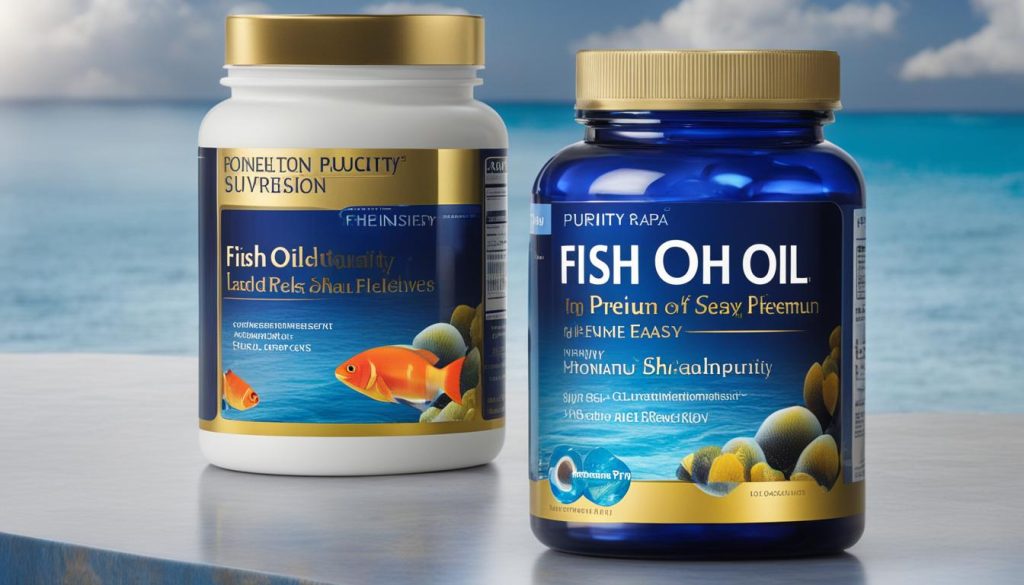Good nutrition is essential for the overall health and well-being of dogs. To ensure proper growth and development, dogs require a balanced diet that includes proteins, fats, carbohydrates, vitamins, and minerals. The specific nutritional needs vary based on the age, weight, physical condition, and lifestyle of the dog.
When it comes to feeding dogs, there are various options available, including dry and canned dog food. However, some dog owners may wonder if fish can be a part of their furry friend’s diet. In this article, I will provide professional insights on whether dogs can have fish, the best types of fish for dogs, and the potential benefits and risks of feeding fish to dogs.
Key Takeaways:
- Dogs can safely eat fish as it provides essential nutrients and omega-3 fatty acids.
- It is important to remove fish bones and cook the fish thoroughly before feeding it to dogs.
- Lean, white-fleshed fish like cod, haddock, and flounder are safer options for dogs.
- Fatty fish like salmon and mackerel are beneficial due to their high omega-3 content.
- Consult with a veterinarian before introducing new foods like fish into a dog’s diet.
What is the Right Food to Feed Your Dog?

When it comes to choosing the right food for your dog, there are several factors to consider. The nutritional needs of dogs vary depending on their age, breed, size, and activity level. It’s important to select a high-quality dog food that provides a balanced diet and meets your dog’s specific needs.
Dry and canned dog foods are the most convenient and cost-effective options for many pet owners. These commercial dog foods are formulated to provide a complete and balanced diet, containing the necessary proteins, fats, carbohydrates, vitamins, and minerals that dogs need to thrive. Look for brands that use real meat as the main ingredient and avoid those that contain excessive fillers or artificial additives.
For puppies, it’s recommended to start them on a puppy-specific formula at around 4 weeks of age. Puppies have different nutritional requirements than adult dogs, and their food should support their growth and development. Adult dogs can be fed a premium brand of dog food that provides balanced nutrition for their age. However, it’s important to adjust the feeding amount according to their activity level and body condition to prevent overeating or underfeeding. Senior dogs may require special diets tailored to their changing needs, such as those formulated for joint health or weight management.
It’s worth noting that feeding guidelines on dog food bags may overestimate the amount of food needed, leading to overfeeding and potential weight gain. It’s important to monitor your dog’s body condition and adjust the amount of food accordingly. Feeding methods such as timed feeding or meal feeding can also help prevent overeating and promote healthy eating habits.
Table: Dog Food Recommendations
| Life Stage | Recommended Dog Food |
|---|---|
| Puppies | Puppy-specific formula for their breed size |
| Adult Dogs | Premium brand dog food for their age |
| Senior Dogs | Specialty diets tailored to their changing needs |
It’s always a good idea to consult with your veterinarian to determine the best food for your dog. They can provide personalized recommendations based on your dog’s specific needs and help you navigate any dietary restrictions or health conditions that may require special consideration.
Can Dogs Have Fish? What You Should Know!

Dogs can safely eat fish as it is a source of protein, omega-3 fatty acids, and essential nutrients. However, there are important considerations when feeding fish to dogs. Fish bones should be removed to avoid choking hazards and internal injuries. Cooked fish is recommended over raw fish to eliminate potential parasites and reduce the risk of bacterial contamination. Plain, unseasoned fish is the best option for dogs. Fish should be fed in moderation as part of a balanced diet, and other protein sources, fruits, vegetables, and commercial dog food should also be included. Lean, white-fleshed fish like cod, haddock, and flounder are safer options for dogs. Fatty fish like salmon and mackerel are beneficial due to their high omega-3 content. However, fish high in mercury, such as swordfish and king mackerel, should be avoided. Some dogs may have allergies or sensitivities to fish, so it’s important to monitor for any adverse reactions. It’s always recommended to consult with a veterinarian before introducing new foods like fish to a dog’s diet.
| Fish | Safe for Dogs? |
|---|---|
| Salmon | Yes |
| Trout | Yes |
| Flounder | Yes |
| Cod | Yes |
| Haddock | Yes |
| Pollock | Yes |
Quote: “Feeding fish to dogs can provide them with essential nutrients and omega-3 fatty acids, which promote healthy skin, coat, and overall well-being.” – Dr. Smith, Veterinarian
In summary, while fish can be a nutritious addition to a dog’s diet, it’s important to consider the risks and take necessary precautions. Fish should be boneless, cooked thoroughly, and fed in moderation. Consultation with a veterinarian is recommended to ensure the specific dietary needs of your dog are met. By following proper guidelines and selecting the right types of fish, you can safely incorporate fish into your dog’s nutrition plan and provide them with the benefits of this healthy protein source.
Can Dogs Benefit From Eating Fish?
Feeding fish to dogs can offer a range of benefits due to its nutritional value. Fish is an excellent source of omega-3 fatty acids, which are essential for maintaining healthy skin and coat. These fatty acids also have anti-inflammatory properties, which can help reduce skin irritations and improve overall skin health in dogs. Additionally, omega-3 fatty acids support cardiovascular health, aid in cognitive function, and contribute to the development of a strong immune system.
In addition to omega-3 fatty acids, fish is also rich in high-quality protein, vitamins, and minerals. Protein is essential for muscle growth and repair, as well as for supporting various bodily functions. The vitamins and minerals found in fish, such as vitamin D and selenium, play important roles in maintaining overall health and supporting vital processes in a dog’s body.
To summarize, incorporating fish into a dog’s diet can be highly beneficial. The omega-3 fatty acids, along with the protein, vitamins, and minerals found in fish, can contribute to healthier skin and coat, improved cognitive function, better cardiovascular health, and enhanced overall well-being in dogs.
The Benefits of Fish for Skin Health in Dogs
Fish is particularly beneficial for maintaining healthy skin in dogs. The omega-3 fatty acids found in fish help reduce inflammation and promote moisturized skin, preventing dryness and itchiness. Fish oil supplements, specifically, are often recommended for dogs with skin conditions like allergies or dermatitis. These supplements can help alleviate symptoms and improve the overall health and appearance of a dog’s skin and coat.
Moreover, the high-quality protein in fish supports the growth and regeneration of skin cells, ensuring the formation of a healthy skin barrier. This barrier is crucial in protecting against external irritants, allergens, and infections, ultimately promoting optimal skin health in dogs.
| Benefits of Feeding Fish to Dogs |
|---|
| Source of omega-3 fatty acids |
| Promotes healthy skin and coat |
| Reduces inflammation |
| Supports cardiovascular health |
| Aids in cognitive function |
| Strengthens the immune system |
Types of Fish Dogs Can Eat

When it comes to feeding fish to dogs, there are several safe options to choose from. These types of fish provide essential nutrients and can be a healthy addition to a dog’s diet. Here are some of the fish that dogs can safely consume:
- Salmon
- Trout
- Flounder
- Cod
- Haddock
- Pollock
These fish are rich in protein, essential fatty acids, and beneficial nutrients. However, it is important to ensure that the fish is boneless and thoroughly cooked to avoid any potential choking hazards or health risks. Fish skin can also be fed in moderation if it is cooked, but it’s important to monitor the fat content. Consulting with a veterinarian before introducing new types of fish into a dog’s diet is always recommended.
| Types of Fish | Benefits |
|---|---|
| Salmon | Rich in omega-3 fatty acids for healthy skin and coat |
| Trout | Good source of protein and essential nutrients |
| Flounder | Low in fat and high in protein |
| Cod | Rich in vitamins and minerals |
| Haddock | Low in calories and high in protein |
| Pollock | High in omega-3 fatty acids and protein |
Feeding fish to dogs can provide them with important nutrients and contribute to their overall health. However, it’s crucial to choose the right type of fish and prepare it properly to ensure your dog’s safety. By including fish in moderation and consulting with a veterinarian, you can incorporate this nutritious food into your dog’s diet.
Risks of Feeding Dogs Fish

Feeding fish to dogs can have its risks and considerations. It’s important to be aware of these potential drawbacks to ensure the health and safety of our furry friends.
Fish Bones and Choking Hazards
One of the primary risks of feeding dogs fish is the presence of bones, which can pose a choking hazard and cause internal injuries if ingested. Fish bones can splinter easily and get lodged in a dog’s throat or digestive tract, leading to serious health complications. Therefore, it is crucial to remove all bones from fish before feeding it to a dog.
Fish Allergies in Dogs
Just like humans, dogs can develop allergies to certain foods, including fish. Some dogs may experience adverse reactions such as gastrointestinal upset, itching, skin rashes, or even more severe symptoms like difficulty breathing or swelling. If you notice any signs of an allergic reaction after introducing fish to your dog’s diet, it’s important to consult with a veterinarian to determine the best course of action.
Mercury and Contaminants
Fish, especially larger predatory fish like tuna and swordfish, can contain high levels of mercury and other contaminants. Consuming fish with high mercury levels can be detrimental to a dog’s health. It’s crucial to choose fish varieties that are low in mercury and avoid feeding dogs fish that may be contaminated with harmful substances.
By being mindful of these risks and taking necessary precautions, such as removing bones and selecting low-risk fish varieties, we can safely incorporate fish into our dogs’ diets and provide them with the nutritional benefits it offers. However, it’s always recommended to consult with a veterinarian before making any significant changes to your dog’s diet to ensure their specific needs are met.
Dietary Fats and Fatty Acids for Dogs

Fats are an important component of a dog’s diet, providing essential nutrients and serving various functions in the body. Dietary fats are a concentrated source of energy, supplying more than double the calories per gram compared to proteins and carbohydrates. They also play a role in the absorption of fat-soluble vitamins and contribute to the formation of cell membranes.
Dogs require essential fatty acids (EFAs) in their diet because they cannot produce them on their own. These EFAs, including omega-6 and omega-3 fatty acids, are crucial for a dog’s overall health and well-being. Omega-6 fatty acids are found in plant-based oils, such as corn oil and sunflower oil, while omega-3 fatty acids are abundant in fatty fish like salmon and mackerel.
The balance between omega-6 and omega-3 fatty acids is essential for a dog’s health. While omega-6 fatty acids are necessary, excessive amounts can lead to inflammation. The inclusion of omega-3 fatty acids helps balance the ratio, reducing inflammation and promoting optimal health. Fish oil supplements are commonly recommended to ensure dogs receive adequate omega-3 fatty acids, especially if their regular diet does not provide sufficient amounts.
Benefits of Essential Fatty Acids for Dogs:
- Promote healthy skin and a shiny coat
- Support cardiovascular health
- Improve cognitive function
- Aid in joint health and mobility
- Enhance the immune system
While dietary fats and essential fatty acids are important for dogs, it’s crucial to provide them in appropriate amounts. Excessive fat consumption can lead to obesity and other health issues. Additionally, it’s essential to consult with a veterinarian to determine the specific dietary needs of your dog and whether fatty acid supplementation is necessary.
| Fatty Acid | Sources | Benefits |
|---|---|---|
| Omega-6 Fatty Acid | Plant-based oils (corn oil, sunflower oil) | Aids in reproductive function, growth, and skin health |
| Omega-3 Fatty Acid | Fatty fish (salmon, mackerel), fish oil supplements | Supports healthy skin and coat, reduces inflammation, promotes cardiovascular health and cognitive function |
Fat Restriction and Supplementation for Dogs
When it comes to a dog’s diet, fat restriction may be necessary for certain medical conditions such as hyperlipidemia, pancreatitis, and lymphangiectasia. Low fat diets can help manage these conditions and may be used as adjunctive therapy despite the desired energy density for the dog’s diet. However, it is important to ensure that essential fatty acid requirements are still met to ensure optimal health.
In some cases, fatty acid supplementation can be beneficial for dogs, particularly with fish oil. Fish oil supplements are commonly used to support inflammatory conditions, cancer, hyperlipidemia, and cardiac disease in dogs. It is important to note that dosing and supplementation should be determined based on the specific needs of the dog and under the guidance of a veterinarian.
To ensure the effectiveness and safety of fish oil supplementation, it is crucial to choose a high-quality product from a reputable company. This helps ensure that the supplement is free from nutrient excess and toxin exposure, such as mercury. It is recommended to inquire about the quality control testing procedures of the manufacturer and consult with an independent evaluator if necessary.
| Benefits of Fish Oil Supplementation for Dogs | Conditions That May Benefit from Fish Oil Supplementation |
|---|---|
| 1. Improved skin and coat health | 1. Inflammatory conditions |
| 2. Support for joint health | 2. Cancer |
| 3. Enhanced cognitive function | 3. Hyperlipidemia |
| 4. Boosted immune function | 4. Cardiac disease |
By carefully considering a dog’s specific needs and following proper guidelines, fat restriction and supplementation, particularly with fish oil, can play a valuable role in supporting a dog’s overall health and well-being.
Quality of Fish Oil Supplements

Choosing the right fish oil supplement for your dog is crucial to ensure its effectiveness and safety. With numerous options available, it’s important to consider the quality of the product to provide your furry friend with the best possible nutrition.
When selecting a fish oil supplement, look for a high-quality product from a reputable company. Ensure that the manufacturer conducts rigorous quality control testing to guarantee the supplement’s purity and potency. Inquire about their testing procedures, including checks for nutrient excess and contaminant levels such as mercury.
Consulting with an independent evaluator or conducting your own research can provide additional peace of mind. Look for certifications or third-party testing labels, as they demonstrate a commitment to quality and transparency. These certifications can include the National Animal Supplement Council (NASC) seal or verification from the Global Organization for EPA and DHA Omega-3 (GOED).
Remember, the quality of the fish oil supplement directly impacts its effectiveness in supporting your dog’s health. By choosing a high-quality product, you can ensure that your furry companion receives the maximum benefits of fish oil without any potential negative effects.
Table: Comparison of High-Quality Fish Oil Supplements
| Brand | Omega-3 Content (mg) | Purity (Tested for Toxins) | Quality Control Certification |
|---|---|---|---|
| Brand A | 1000 | Yes | Yes |
| Brand B | 1200 | Yes | Yes |
| Brand C | 800 | Yes | Yes |
Note: The table above provides a comparison of high-quality fish oil supplements based on omega-3 content, purity, and quality control certifications. Please consult with your veterinarian to determine the most suitable supplement for your dog.
Wrapping Up
After exploring the topic of whether dogs can have fish, it is clear that fish can be a beneficial addition to a dog’s diet. Fish provides essential nutrients such as protein, omega-3 fatty acids, vitamins, and minerals that contribute to overall health and well-being. However, it is important to take certain precautions when feeding fish to dogs.
To ensure the safety of your dog, always remove any fish bones to prevent choking hazards and internal injuries. Cooked fish is recommended over raw fish to eliminate potential parasites and reduce the risk of bacterial contamination. It is also essential to feed plain, unseasoned fish in moderation as part of a balanced diet that includes other protein sources, fruits, vegetables, and commercial dog food.
While lean, white-fleshed fish like cod and haddock are safer options for dogs, fatty fish like salmon and mackerel can be beneficial due to their high omega-3 content. However, it is crucial to avoid fish high in mercury, such as swordfish and king mackerel, as they can be harmful to your dog’s health.
To sum up, fish can be a valuable and nutritious component of a dog’s nutrition plan. By considering the individual needs of your dog, consulting with a veterinarian, and following proper guidelines, you can safely incorporate fish into your dog’s diet and provide them with the essential nutrients they need for optimal health.
FAQ
Can dogs have fish?
Yes, dogs can safely eat fish as it is a source of protein, omega-3 fatty acids, and essential nutrients. However, there are important considerations when feeding fish to dogs. Fish bones should be removed to avoid choking hazards and internal injuries. Cooked fish is recommended over raw fish to eliminate potential parasites and reduce the risk of bacterial contamination. Plain, unseasoned fish is the best option for dogs. Fish should be fed in moderation as part of a balanced diet, and other protein sources, fruits, vegetables, and commercial dog food should also be included. Lean, white-fleshed fish like cod, haddock, and flounder are safer options for dogs. Fatty fish like salmon and mackerel are beneficial due to their high omega-3 content. However, fish high in mercury, such as swordfish and king mackerel, should be avoided. Some dogs may have allergies or sensitivities to fish, so it’s important to monitor for any adverse reactions. It’s always recommended to consult with a veterinarian before introducing new foods like fish to a dog’s diet.
What is the right food to feed your dog?
The right food for your dog should provide a balanced and nutritious diet based on your dog’s age, weight, physical condition, and lifestyle. Good nutrition is crucial for dogs to grow, develop, and stay healthy. The key components of canine nutrition include proteins, fats, carbohydrates, vitamins, and minerals. Dry and canned dog food are the most convenient and cost-effective choices for feeding dogs. Puppy food should be started at around 4 weeks of age and fed in multiple meals throughout the day. Adult dogs can be fed a premium brand of dog food that provides balanced nutrition. Senior dogs may require special diets tailored to their changing needs. Feeding methods such as timed feeding and meal feeding are recommended to prevent overeating. The guidelines on dog food bags for feeding amounts may be too high in calories, so portion control is important.
Can dogs benefit from eating fish?
Feeding fish to dogs can provide a range of health benefits. Fish is a rich source of omega-3 fatty acids, which promote healthy skin and coat, reduce inflammation, support cardiovascular health, and improve cognitive function. Fish is also a high-quality source of protein, essential vitamins, and minerals. The nutrients found in fish can contribute to improved immune function, joint health, digestive health, and heart health in dogs. The omega-3 fatty acids in fish help manage various skin conditions and support a stronger immune system.
What types of fish can dogs eat?
There are several types of fish that dogs can safely consume. Some safe options include salmon, trout, flounder, cod, haddock, and pollock. These fish are rich in protein, essential fatty acids, and beneficial nutrients. However, it’s important to ensure that the fish is boneless and thoroughly cooked to avoid choking hazards and potential health risks. Fish skin can also be fed in moderation if cooked but should be monitored for fat content. It’s advised to consult with a veterinarian before introducing new types of fish into a dog’s diet.
What are the risks of feeding dogs fish?
While fish can be a nutritious addition to a dog’s diet, there are potential risks to be aware of. Fish bones can pose a choking hazard and cause internal injuries if ingested. Raw or improperly cooked fish can contain parasites or harmful bacteria that may lead to foodborne illnesses in dogs. Some types of fish, particularly larger predatory fish like tuna and swordfish, can contain high levels of mercury, which can be harmful in large quantities. Additionally, some dogs may have allergies or sensitivities to fish, so it’s important to monitor for any adverse reactions. It’s recommended to remove all bones from fish and cook it thoroughly before feeding it to a dog.
What are dietary fats and fatty acids for dogs?
Dietary fats and fatty acids play a crucial role in a dog’s nutrition. Fats provide energy, aid in fat-soluble vitamin absorption, modulate inflammation, act as a precursor to important substances, and serve structural roles in cell membranes. Dogs require essential fatty acids, including omega-6 and omega-3 fatty acids, in their diet because they cannot produce these on their own. Essential fatty acids are necessary for healthy skin and coat, reproductive function, growth, and overall well-being. Sources of essential fatty acids for dogs include plant-based oils for omega-6 fatty acids and fish oil for omega-3 fatty acids. It is important to ensure that pet food provides these essential fatty acids in appropriate amounts to meet a dog’s nutritional needs.
When is fat restriction and supplementation necessary for dogs?
Fat restriction may be necessary for certain medical conditions in dogs, such as hyperlipidemia, pancreatitis, and lymphangiectasia. Low-fat diets can help manage these conditions and may be used as adjunctive therapy despite the desired energy density for the dog’s diet. However, essential fatty acid requirements should still be met to ensure optimal health. In some cases, fatty acid supplementation, particularly with fish oil, can be beneficial for dogs. Fish oil supplements are commonly used to support inflammatory conditions, cancer, hyperlipidemia, and cardiac disease in dogs. Dosing and supplementation should be determined based on the specific needs of the dog and under the guidance of a veterinarian.
What should I consider when choosing a fish oil supplement for my dog?
When choosing a fish oil supplement for dogs, it is important to select a high-quality product from a reputable company with good quality control practices. This helps ensure that the supplement is free from nutrient excess and toxin exposure, such as mercury. It is recommended to inquire about the quality control testing procedures of the manufacturer and consult with an independent evaluator if necessary. Prioritizing the quality of the fish oil supplement is essential to ensure its effectiveness and safety for dogs.
Can dogs have fish skin?
Yes, fish skin can be fed to dogs in moderation if it is cooked. However, it should be monitored for fat content. Fish skin is a source of omega-3 fatty acids and can provide additional nutritional benefits for dogs. It’s important to remove any seasoning or spices before feeding fish skin to dogs.






